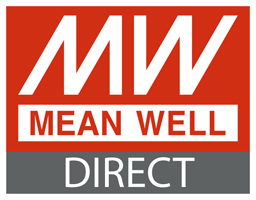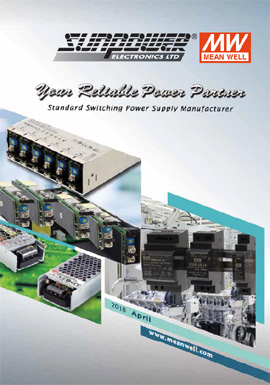MEAN WELL Power Supply Frequently Asked Questions
Welcome to the MEAN WELL DIRECT FAQ section. If you have any questions about any of our products please do not hesitate to contact us.
a) To increase the lifetime of the S.P.S., we suggest users choosing the model that has a rating of 30% more power than actual need. For example, if the system needs a 100W source, we suggest that users may choose a S.P.S. with 130W of output power or more. By doing this, you can effectively boost the lifetime of the S.P.S. in your system.
b) You also need to consider the ambient temperature of the S.P.S. and whether there is additional equipment for dissipating the heat. If the S.P.S. is working in a high-temperature environment, you will need to allow for some deration to the output power. The derating curve of “ambient temperature” versus “output power” can be found on the product datasheets.
c) Choosing all kinds of function based on your application:
- Protection function: Over Voltage Protection (OVP), Over Temperature Protection (OVP), Over Load Protection (OLP), etc.
- Application function: Signalling Function (Power Good, Power Fail), Remote Control, Remote Sensing, etc.
- Special function: Power Factor Correction (PFC), Uninterruptible Power Supply (UPS) function.
d) Make sure that the model qualifies for the verification of safety standards and EMC regulations you need.
MEAN WELL’s power supply can be used within this frequency range. But if the frequency is too low, the efficiency will also be lower. For example, when a SP-200-24 is operated under 230VAC and rated load, if the frequency of AC input is 60 Hz, the efficiency is around 84%; however, if the frequency of AC input reduces to 50 Hz, the efficiency will be around 83.8%. If the frequency is too high, the power factor of the S.P.S. with PFC (power factor correction) function will reduce and this also will cause higher leakage current. For example, when a SP-200-24 is operated under 230VAC and rated load, if the frequency of AC input is 60 Hz, the power factor is 0.93 and the leakage current is around 0.7mA; however, if the frequency of AC input increase to 440 Hz, the power factor will decrease to 0.75 and the leakage current will rise to around 4.3mA.
Due to the requirement of EMI, there will be some Y capacitors between line and neutral to the FG (case) to improve EMC. These Y capacitors will cause some leakage current from line or neutral to the case (normally case will be connected to earth ground). For example, IEC-60950 requires that this current should less than 3.5 mA for information equipment, so basically the leakage current you find on the case will not hurt human body.
YES, basically you can do this alternative to get the right output voltage, but be careful that the rating output current of the series system should be the rating of the minimum one in these series power supplies.
No, you cannot do this connection because S-320 does not operate in this way. When two power supplies are connected in parallel, the one with the higher output voltage will demand and deliver more of the (even “all”) power to the load and cause the two power supplies unbalance. We suggest using PSP-500 or PSP-600 as these are equipped with the function of parallel operation.
Yes, but be careful that if the voltage of the battery is higher than the power supply, the power will flow from the battery side to S-50 and damage it. We suggest adding a blocking diode in series with the positive output to protect the S-50. Also, be careful about the heat problem of this blocking diode.
There are some minimum-load requirements on MEAN WELL’s multi-output power supplies; please refer to the specification before connecting the load. When the load condition is 5V/ 4A, 12V/ 0A, the output voltage of the 12V channel will be around 12.8V that is over the ±6% of voltage deviation (12.72V) specified in the spec sheet. If we add in the minimum load 0.2A to the 12V channel, the 12V channel will reduce to around 12.3V, which is within the specification.
Some models control the fan based on internal temperature to extend its lifetime. If the internal temperature does not reach the preset value, the fan will remain steady until receiving the start up signal.
In general there are two circumstances that the power supply will be shut down. The first one is the activation of the over-load-protection (OLP). To deal with this situation, we suggest increasing the rating of the output power or modifying the OLP point. The second one is the activation of over-temperature protection (OTP) when the internal temperature reaches the pre-set value. All of these conditions will let the S.P.S. enter protection mode and shut down. After these conditions are removed, the S.P.S. will be back to normal.
If you connect the S.P.S. to motors, lighting bulbs, or high capacitive loads, you will have a high output surge current when you turn on the S.P.S. and this high surge current will cause failure to start up. We suggest using S.P.S. with constant current limiting protection to deal with these loads.
MEAN WELL has ESC, SC, PA & PB series for battery charging purposes (120~360W). If these series do not meet your customers ’ demands and they would like to choose a power supply as a charger, we advice to select one with over load protection (OLP) mode is constant current limiting. The models in this mode provide constant current even when the protection circuit is triggered.
The second choice is a fold-back current limiting or constant wattage model. In this model, when a battery is running low, the output current of the power supply will gently increase. The level of increase depends on your battery’s capacity and degree of exhaustion.
Hiccup or shut down model are not recommended because it will cease to generate current when OLP occurs.
Yes. Since our products are designed based on an isolation concept, it will be no problem that the output ground (GND) and frame ground (FG) are at the same point in your system. But, EMI may be affect by this connection.

